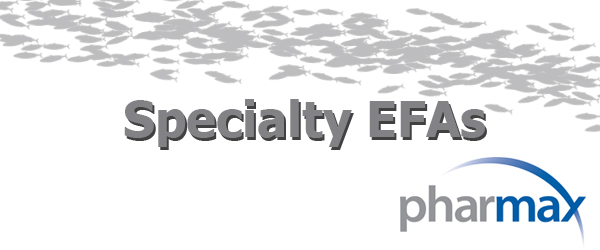Last week we discussed the value of essential fatty acids and the processing methods that keep them from going rancid or being altered. The processing of EFAs is done for the purpose of concentrating or boosting EPA/DHA levels, and also designing higher- or lower-ratio products.
Many integrated physicians and nutritional practitioners often prefer cod liver oil because it is the least processed. Cod liver oil is often considered more natural, as it has lower amounts of EPA/DHA, and also includes naturally occurring Vitamins A and D. The downside of cod liver oils is that they don’t have the levels of EFAs that are often needed in a clinical practice. However, there are some other natural choices that practitioners can add to augment the use of cod liver oil.
EPA and DHA are crucial to brain development and normal brain functioning. The n-6 and n-3 series of long-chain polyunsaturated fatty acids (LC-PUFA) have an important role during gestation, lactation and infancy since they are constituents of cell membrane phospholipids and precursors of eicosanoids. LC-PUFA are bio-synthesised from essential fatty acids (EFA) (linoleic acid, LA, 18: 2n-6, and linolenic acid, LNA, 18:3 n-3) by successive desaturation and elongation steps in the intestine, liver and brain.
Higher levels of DHA are particularly beneficial in pregnancy to make sure that mom and baby have enough critical fats to maintain and build brain cells. Adding products like Pharmax’s MicroCelle Vega DHA capsules can be used to boost dietary DHA intake levels without fish oils. It’s a powdered capsule form of DHA and can therefore be used for vegans and anyone with fat-handling challenges, or patients who don’t like fish products, because it is a uniquely derived algae source of DHA and Vitamin E. Two capsules provide 200 mg of DHA and 40 IU of Vitamin E.
Both arachidonic acid (AA, 20:4 n-6) and docosahexaenoic acid (DHA, 22:6 n-3), are found in neural structures, and DHA is a component of neurone membranes and external segments of photoreceptors in the retina. As such, algal DHA supplementation supports neurological function. DHA supplementation of breastfeeding mothers (approximately 200 mg algal DHA/day for 4 months after delivery) results in higher child plasma phospholipid DHA contents during supplementation and a higher Bayley Psychomotor Development Index at 30 months of age, but results in no other advantages either at or before this age.
Another great source of Omega 3s is from ALA found in Pharmax Pure Organic Flaxseed Oil. At 2500 mg ALA per teaspoon serving size, this product provides EPAs in a convenient, great-tasting liquid format for increased patient compliance.
Flaxseed contains 35% of its mass as oil, of which 58% is alpha-linolenic acid (ALA). Human studies have shown that flaxseed and flaxseed oil can modestly reduce serum total and low-density lipoprotein cholesterol (15-50 g/day flaxseed or powder) concentrations, reduce postprandial glucose absorption (40 grams ground flaxseed), decrease some markers of inflammation (14 grams ALA from flaxseed oil), and raise serum levels of the omega-3 fatty acids, ALA and eicosapentaenoic acid.
The compliance or elasticity of the arterial system, an important index of circulatory function, diminishes with increasing cardiovascular risk. Systemic arterial compliance has been shown to improve through ingestion of fish and fish oil. Similarly, enhanced arterial compliance was reported following 4 weeks of flaxseed oil supplementation (20 grams ALA from flaxseed oil) in obese subjects. Flaxseed oil (14 grams ALA per day or higher) decreases platelet aggregation and increases platelet activating inhibitor-1 and bleeding time.
Because of its omega-3 anti-inflammatory effect and high lignin content, flaxseed oil has been proven to help modulate estrogen and progesterone levels in women. For relief from hot flashes or PMS symptoms, we recommend the addition of Pharmax Pure Organic Flax Seed Oil to your protocols if you aren’t currently recommending this product.
For more information about alternative forms of EFAs, and samples and catalogs from Pharmax, please feel free to call our Physician Support Line at 864-408-8320 x. 102, or e-mail support@anovahealth.com.





Speak Your Mind